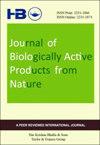Evaluation of Metabolic Enzyme Inhibitory Potency with Molecular Docking Assisted Studies: Phenolic Compound Analysis of Seseli resinosum
IF 1
Q4 CHEMISTRY, MEDICINAL
Journal of Biologically Active Products from Nature
Pub Date : 2023-01-02
DOI:10.1080/22311866.2023.2186488
引用次数: 0
Abstract
Abstract Seseli taxa are widely known as a traditional medicinal herb, and S. resinosum collected from stony and rocky areas is endemic to the flora of Turkey. In this study, to reveal the plant's pharmacological importance, its ability to inhibit some medicinal enzymes was examined, assisted by molecular docking studies and phytochemical component analysis. The IC50 values for studied enzymes were calculated between 0.434 - 92.81 μg/mL, and the extract has lower inhibitory concentrations against α-glucosidase, α-amylase, and HMG_CoA reductase involved in carbohydrate and cholesterol metabolism. In addition, reverse-phase HPLC analysis was performed to correlate the enzyme inhibition ability with phenolic compositions. Benzoic acid and methyl chavicol were detected as the most abundant ingredients with the amount of 204.50±2.23 and 93.18±1.01 μg g-1, respectively. TPC and TFC of the extract were founded at 31.23 ± 0.56 GAE/g and 5.54 ± 0.11 QE/g, respectively. The extract showed inhibitory and lethal effects, especially against all tested gram-negative strains at 7.5 and 15 mg mL-1, respectively. In conclusion, the present study demonstrated that S. resinosum extract harbors bioactive compounds with inhibitory properties such as benzoic acid and catechin. It is expected that these primary data on the S. resinosum may contribute to building new experimental studies to open new avenues for research to support the pharmacological effects. GRAPHICAL ABSTRACT用分子对接辅助研究评价代谢酶抑制效能:芝麻树脂酚类化合物分析
Seseli是一种被广泛认为是传统药材的植物群,而Seseli是土耳其石质地区特有的植物群。本研究通过分子对接研究和植物化学成分分析,研究了该植物对一些药用酶的抑制能力,揭示了该植物的药理作用。对所研究酶的IC50值在0.434 ~ 92.81 μg/mL之间,对参与碳水化合物和胆固醇代谢的α-葡萄糖苷酶、α-淀粉酶和HMG_CoA还原酶具有较低的抑制浓度。此外,反相高效液相色谱法分析了酶抑制能力与酚类成分的关系。其中苯甲酸和甲基chavicol含量最高,分别为204.50±2.23和93.18±1.01 μg -1。TPC和TFC分别为31.23±0.56 GAE/g和5.54±0.11 QE/g。提取物在7.5 mg mL-1和15 mg mL-1时对所有革兰氏阴性菌株均有抑制和致死作用。综上所述,本研究表明树脂提取物含有苯甲酸和儿茶素等具有抑制作用的生物活性化合物。希望这些初步数据能有助于建立新的实验研究,为支持其药理作用的研究开辟新的途径。图形抽象
本文章由计算机程序翻译,如有差异,请以英文原文为准。
求助全文
约1分钟内获得全文
求助全文
来源期刊

Journal of Biologically Active Products from Nature
Agricultural and Biological Sciences-Agricultural and Biological Sciences (miscellaneous)
CiteScore
2.10
自引率
0.00%
发文量
21
 求助内容:
求助内容: 应助结果提醒方式:
应助结果提醒方式:


